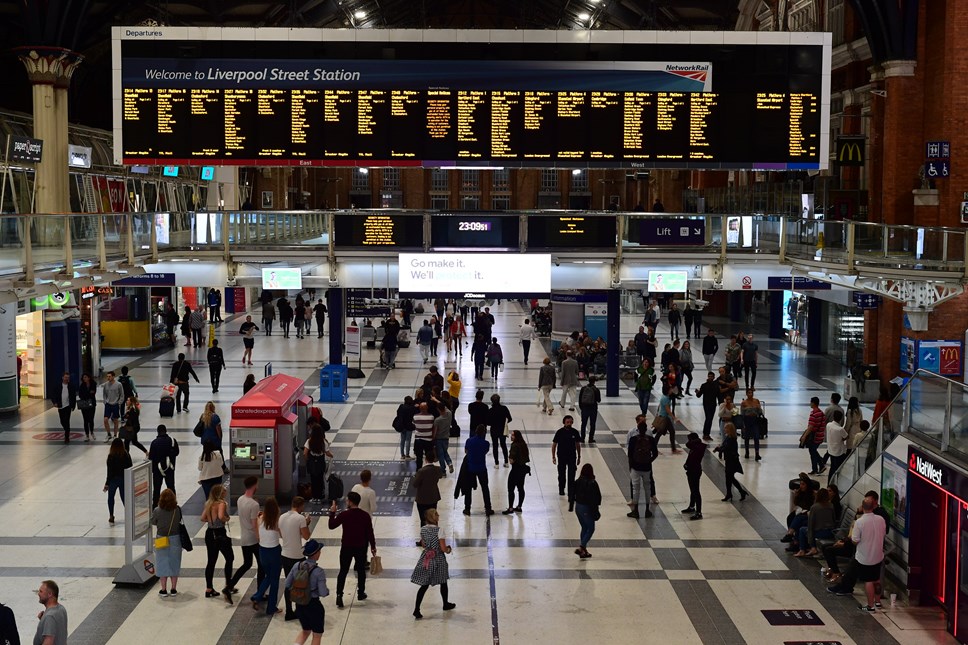
Rail fares for 2020 published – fares held below inflation for third year running as record investment continues
Train fares will rise on average by 2.7% next year. This is the third year in a row that train companies have held the average change across all fares below the July RPI rate of inflation, which regulated fares are pegged to.
98p from every £1 spent on fares goes into running the railway with fares almost covering running costs freeing up public money to fund capital spending on improvements to the railway
- As part of a long-term improvement plan being delivered by the rail industry 1,000 extra carriages and 1,000 extra services will be added in 2020
- Rail companies want to work with any future government to make fares easier for customers by reforming outdated regulations
Train companies have confirmed that rail fares will go up on average by 2.7% next year, lower than July’s RPI measure of inflation which is used by government to peg changes to around half of all fares. This is the third year in a row and the fifth time in the last seven years that fares have been held below inflation.
With 98p in every pound from fares going towards the cost of running the railway, ticket money is enabling unprecedented investment to improve journeys. As part of a programme to replace half the nation’s trains new for old by 2025, rail companies will deliver a thousand extra train carriages across the country next year alone. This will support the introduction of 1,000 new services to weekly timetables for next year, part of 11,300 extra being added by 2025.
Together with major upgrades to infrastructure and stations, this means more seats on more comfortable, more reliable and more frequent trains and better-connected communities, boosting Britain’s economic potential. Next year, rail users will benefit from:
- Scotland: A £120million major redevelopment of Glasgow Queen Street Station will be completed and the redevelopment of Aberdeen Station will begin
- North of England: new and upgraded trains will be delivered for passengers travelling with TransPennine Express, Merseyrail, LNER, Northern, Hull Trains and Grand Central
- Wales: £40 million train upgrade programme will continue with 186 more services running on Sundays
- Midlands: A new half-hourly service between St Pancras International and Corby will be introduced, 180 new trains with space for 50,000 additional passengers to and from Birmingham will start to run, and Wolverhampton Interchange will also open as part of a £150 million transport hub
- East Anglia: £1.4 billion investment in 169 new trains on Greater Anglia and a £27 million route upgrade allowing longer trains to run between Cambridge and King´s Lynn. Track upgrades will enable 10 extra freight trains per day to run to Felixstowe, removing up to 760 lorries from the road
- South West: quicker, more regular services following planned timetable change and £80 million upgrade of the sea wall in Dawlish
- London and South of England: 90 new trains on South Western Railway and construction will start on the £150 million upgrade of Gatwick Airport station
Alongside delivering improvements to passenger services, rail companies are proposing changes to Britain’s decades-old fares system in order to offer passengers an easier to use, better value range of fares which are up to date with how people live and work today.
Following a mass consultation last year which saw almost 20,000 people setting out what they would want from a renewed system, the proposals included plans for mix and match, tap-in-tap-out fares with a price cap across the country, and a far greater range of walk-up fares to reduce overcrowding on some of Britain’s busiest long-distance routes. Changes to regulations would also enable the industry to offer a fare guarantee for the first time, ending the need to find complicated work-arounds to get cheaper deals.
Paul Plummer, Chief Executive of the Rail Delivery Group, representing train operators, said:
“We understand that no one wants to pay more to travel, which is why train companies have for the third year in a row held the average fare increases below inflation while still investing to improve journeys. Passengers will benefit from 1,000 extra, improved train carriages and over 1,000 extra weekly services in 2020 and the industry will continue to push for changes to fares regulations to enable a better range of affordable, mix and match fares and reduced overcrowding on some of the busiest routes.”
Previous governments have decided that farepayers and not taxpayers should cover most of the cost of running the railway. This frees up public funds for record levels of investment in infrastructure to improve journeys and support economic growth. Governments use inflation to peg changes to around 45% of fares which are regulated, including season tickets. The rest are influenced by a range of factors including the payments train companies make to governments.
The average overall increase includes all national rail fares and will come into effect on 2nd January 2020. Individual fares can be viewed on the National Rail Enquiries website and tickets for 2020 can be bought online and at ticket offices now.
-- ENDS --
Notes to editors
- Download our updated document: Rail Fares Explained, detailing why fares change, how money from fares is spent and steps the industry is taking to make fares easier for our customers.
- For more information on the improvements that will be delivered next year, read our 2020 Investment Report.
- In Scotland, selected regulated peak fares, including Anytime and Season tickets, are set to the level of the Retail Price Index (RPI), and one per cent below RPI for regulated Off-Peak fares.
